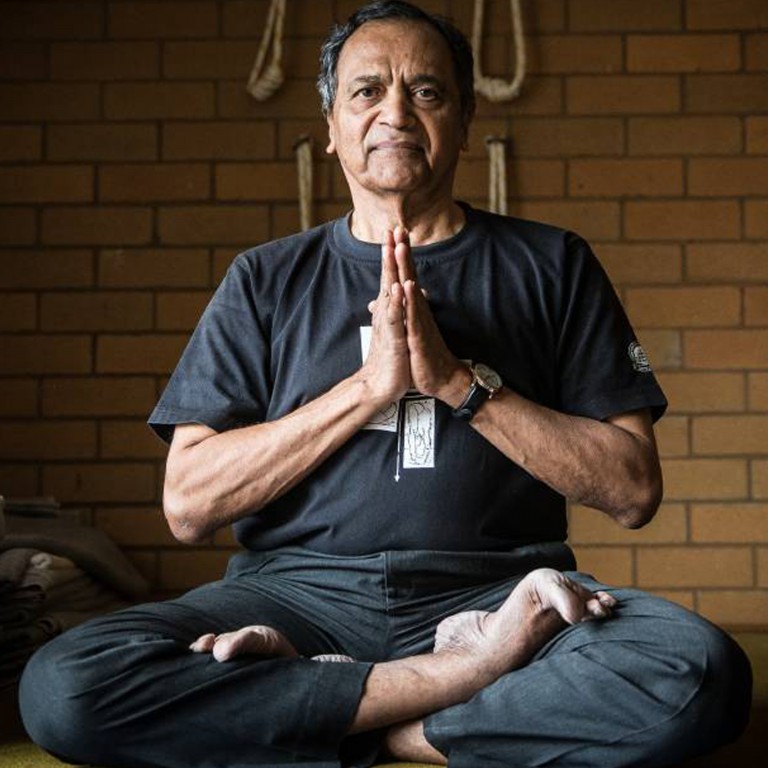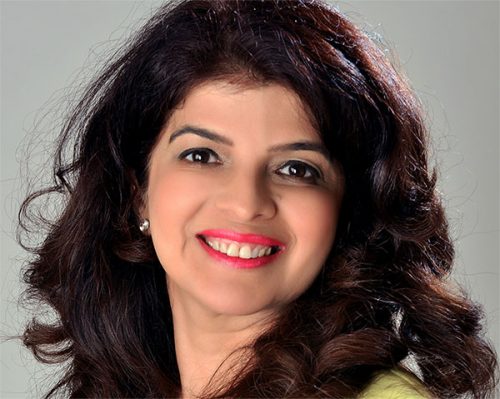Dr Anjali Chhabria, a leading psychiatrist and psychotherapist of India… “When people do yoga regularly they have better control on their emotional health,”
MINAL SANCHETI discovers that there is more to doing yogasana than exercise – it can also have a positive bearing in turning the mind into a happy place to be… doctors should prescribe yoga to patients for a healthy mind and many do just that nowadays with rewarding results!
IN these times when a lot of attention is given to physical health and immunity, we are missing the most essential part of our body – our brains! A major part of our society is either we ignore or remain unaware of mental health issues and how they do affect the overall quality of life.
With the help of yoga we understand ourselves at a mu ch deeper level and during this journey we heal the stresses and tensions which bother mind and body. “Yoga helps you get balanced, helps you to relax and helps you to calm down. Mental health is a very big word. When people practice yoga regularly, what they are doing is working towards a more balanced and healthier lifestyle. You become more flexible. You are more aware of what you are eating. You make more rational decisions. You have a healthier lifestyle. It definitely helps where anxiety is concerned. If someone gets an attack of depression it will not prevent that. It’s not a cure for that. It is just something that helps. It helps everybody,” says Dr Anjali Chhabria, a leading psychiatrist and psychotherapist of India.
Yoga makes us emotionally strong. “When people do yoga regularly they have better control on their emotional health,” says Dr Chhabria. Yoga brings back our mind to a normal state. Dr Shivarama Varambally, a Professor of Psychiatry, MD, at National Institute of Mental Health and Neuro-Sciences, says, “In most mental illnesses, the brain’s capacity to heal itself is reduced as the situation has gone beyond a point. But it has been observed how yoga practice seems to bring back the body and the brain to a better state of equilibrium (homeostasis), thus helping the brain to regain control of itself.”
He further adds, “It seems to change the connectivity and blood flow patterns in the brain which bring the brain back to a state where it can resume healing itself (improved neuroplasticity).”

Yoga has proved to be very effective in mild or moderate depression amongst other mental health disorders. “There is quite good evidence for efficacy in depression and to a lesser extent in anxiety disorders, childhood disorders like ADHD, somatoform disorders, cognitive impairment in the elderly, schizophrenia and psychosis (as an adjuvant), substance use disorders,” says Dr Varambally.
If one is going through anxiety, yoga can be helpful. Dr Anjali Chhabria says, “Anxiety can be helped from yoga. There is lots and lots of research which has been done that shows yoga helps anxiety. Just the fact that you can get up and practice regularly, you feel better and you have more control over your mind.”
In old age patients who are going through diabetes, hypertension and early stages of memory loss, yoga can improve the condition. Dr. Varambally says, “Mild cognitive impairment in the elderly, people who are 60 or 65 years old, especially those who have diabetes and hypertension and those who have memory difficulty, like say for example they keep forgetting names or forgetting roads, but they have not reached the stage of dementia; if yoga is practiced at that time then there are good chances that your memory can improve. We have done studies in the old age home in Bangalore and in the six months of yoga, people’s memory, sleep and quality of life have significantly improved.”
“Yoga can be a substitute for medicines in some cases like anxiety and mild to moderate depression,” says Dr Varambally. He further adds, “However, in most cases, yoga may be used along with medication and other conventional treatment approaches including psychotherapy.”
In the case of mental health disorders like schizophrenia, yoga along with medicines can be beneficial. Dr Varambally says, “we have disorders like schizophrenia and psychosis where we have shown that yoga can help very much. Of course there it is under the condition that we don’t stop medicines. Yoga is an add on to the medicines. We should not get the idea that if a person with schizophrenia starts yoga, he can stop the medicines.”
Father Joe Pereira of Kripa Foundation teaches Hatha Yoga to his patients who are recovering addicts or alcoholics. The hatha yoga he follows is one taught by BKS Iyengar. “ Iyengar yoga is a holistic yoga and I use it for addiction. It suits the body, the mind and the soul. This school of yoga addresses therapeutic issues and I blend it with the 12 step program which is the part of Alcohol Anonymous. There is a seventh step which is being ready for God to remove the character defect of the patient. The character defect of recovering alcoholics and recovering addicts is often found to be psychosis, schizophrenia induced by alcohol, psychosis induced by cannabis.”
“In Hatha yoga, you are not on your thinking mind but on your right brain. And that non-discursive brain brings you into the here and now,” says Father Joe Pereira who teaches the Iyengar method of Hatha yoga to Alcohol and substance addict patients. The body posture, breathing exercises and meditation aligns our body and calms our mind. The Iyengar method of Hatha yoga increases body stability and stamina. Props are also used in this method of Hatha Yoga.The use of props is the compassion of guruji to help abused bodies to get the right posture. This method of using props has made Yog accessible to the most abused bodies and they learn how to love their bodies back to life.”
Mr N (name changed), a software engineer from Bangalore, gives a positive feedback about yoga, “I had a lot of challenges at workplace and amidst these, I got married. It was quite stressful and these factors led to interpersonal relationship issues in the family. I am an introvert by nature and usually suppress my emotions. Gradually, this in-built stress was showing up as stiffness all over the body, weakness, disturbed sleep, difficulty to concentrate at work, and the relationship with my wife started deteriorating.
“It came to a point where I could not console myself and handle situations at work and family. Then I approached NIMHANS to seek professional help where I was diagnosed with depression. I requested my doctor if I could postpone taking medication if my illness was not too severe. So, I was given a choice to volunteer for a yoga based research study, where yoga practices were taught exclusively for patients diagnosed with depression.
“I had practiced yoga watching the television and was aware of its benefits. Similarly, I felt that contributing to research can help other people too. Hence, I considered being a part of the study and attended the yoga sessions for a period of one month.
There was a difference when I did yoga on my own and when practiced under guidance. I liked doing all the practices taught and there were visible changes seen, like the stiffness in my body reduced, there was improvement in sleep. I started feeling refreshed, relaxed and there was clarity in my thoughts. I was able to concentrate, felt confident and I could see my self-esteem setting in. All these changes reflected in work and improved relationships at home and workplace.
“I am happy to say that I stand as an example and I wish to make yoga as a routine and continue forever. My message is that one should do yoga regularly in a disciplined way for a certain period if you really want to see the change in yourself.”
In conclusion, we must accept the fact that in our fast paced modern urban life it is difficult to stay away from stress and anxiety. It makes sense to make time for some yoga practice including pranayama so that serves as a protective umbrella, to counter the kind of stresses and anxieties which exist in our life and which do eventually lead to a gamut of mental health problems and illnesses. Yoga can rescue you and put you on the path to reaping happiness!
